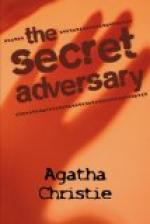“Sorry, Tuppence. What I meant was that we work like moles in the dark, and that he has no suspicion of our nefarious schemes. Ha ha!”
“Ha ha!” echoed Tuppence approvingly, as she rose.
South Audley Mansions was an imposing-looking block of flats just off Park Lane. No. 20 was on the second floor.
Tommy had by this time the glibness born of practice. He rattled off the formula to the elderly woman, looking more like a housekeeper than a servant, who opened the door to him.
“Christian name?”
“Margaret.”
Tommy spelt it, but the other interrupted him.
“No, G U E.”
“Oh, Marguerite; French way, I see.” He paused, then plunged boldly. “We had her down as Rita Vandemeyer, but I suppose that’s incorrect?”
“She’s mostly called that, sir, but Marguerite’s her name.”
“Thank you. That’s all. Good morning.”
Hardly able to contain his excitement, Tommy hurried down the stairs. Tuppence was waiting at the angle of the turn.
“You heard?”
“Yes. Oh, Tommy!”
Tommy squeezed her arm sympathetically.
“I know, old thing. I feel the same.”
“It’s—it’s so lovely to think of things—and then for them really to happen!” cried Tuppence enthusiastically.
Her hand was still in Tommy’s. They had reached the entrance hall. There were footsteps on the stairs above them, and voices.
Suddenly, to Tommy’s complete surprise, Tuppence dragged him into the little space by the side of the lift where the shadow was deepest.
“What the——”
“Hush!”
Two men came down the stairs and passed out through the entrance. Tuppence’s hand closed tighter on Tommy’s arm.
“Quick—follow them. I daren’t. He might recognize me. I don’t know who the other man is, but the bigger of the two was Whittington.”
CHAPTER VII
THE HOUSE IN SOHO
Whittington and his companion were walking at a good pace. Tommy started in pursuit at once, and was in time to see them turn the corner of the street. His vigorous strides soon enabled him to gain upon them, and by the time he, in his turn, reached the corner the distance between them was sensibly lessened. The small Mayfair streets were comparatively deserted, and he judged it wise to content himself with keeping them in sight.
The sport was a new one to him. Though familiar with the technicalities from a course of novel reading, he had never before attempted to “follow” anyone, and it appeared to him at once that, in actual practice, the proceeding was fraught with difficulties. Supposing, for instance, that they should suddenly hail a taxi? In books, you simply leapt into another, promised the driver a sovereign—or its modern equivalent—and there you were. In actual fact, Tommy foresaw that it was extremely likely there would be no second taxi. Therefore he would have to run. What happened in actual fact to a young man who ran incessantly and persistently through the London streets? In a main road he might hope to create the illusion that he was merely running for a bus. But in these obscure aristocratic byways he could not but feel that an officious policeman might stop him to explain matters.




